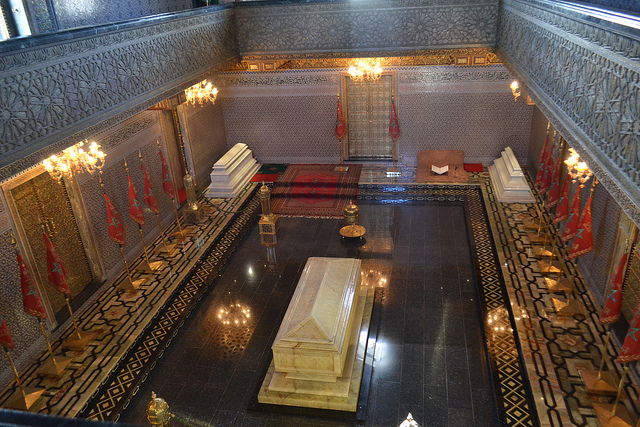Updated
Remembering King Hassan II, 19 years after his death — Ambassador Edward M. Gabriel (ret.)

Mohammed V Mausoleum Photo: Alan Cordova
Ambassador Edward M. Gabriel (ret.)
July 23, 2018
 Today marks the 19th anniversary of the death of King Hassan II. Anyone associated with Morocco remembers where they were and what they were doing at the moment they heard of the King’s passing. And although that day is remembered with great sadness, it was also filled with hope for a new beginning with his son, King Mohammed VI. Few people argue with the fact that King Hassan was the right person at the right time, and likewise, that King Mohammed VI is now the right person at the right time.
Today marks the 19th anniversary of the death of King Hassan II. Anyone associated with Morocco remembers where they were and what they were doing at the moment they heard of the King’s passing. And although that day is remembered with great sadness, it was also filled with hope for a new beginning with his son, King Mohammed VI. Few people argue with the fact that King Hassan was the right person at the right time, and likewise, that King Mohammed VI is now the right person at the right time.
King Hassan will be remembered for opening up the political space and paving the way for a more representative government beginning in the early 1990s. It was not a given that he would make this choice since allowing dissenting voices was not what some might have expected based on his record, but clearly he saw that things were changing and that he needed to begin a process that his successor would inherit. His decision to allow a competitive election in 1997 was a critically important choice for the country’s political evolution – especially as it allowed the opposition to take the reins of government.
Less than six months before he passed away, and prior to a ministerial meeting in March of 1999, I met with King Hassan to discuss US relations with the Youssoufi opposition government. I believed that more could be done to accelerate our shared policies and priorities. “Mr. Ambassador, at this time it is important for us to choose virtue over efficiency” was King Hassan’s memorable response, as explained that it was the time in his country’s history to balance effective governance and democratic principle.
King Hassan’s focus on building one cohesive country with strong military and security protections, and his loyalty to Morocco’s historic alliances with the West, showed his resolve to build a modern independent country. He remained faithful to its friends in Europe and America because those nations were closer to what he viewed as more important values for his nation.
I marched behind King Mohammed VI on July 25th, as horses carried the caisson of King Hassan to his burial at the Mohammed V Mausoleum in Rabat. Heads of State of more than 50 countries attended the funeral, including kings and princes, presidents and prime ministers, and more than 2 million Moroccans from across the country. “The King is dead, long live the King” was the chant of millions of people, as they mourned the death of one King and celebrated the rise of a new one.
President Clinton, overrode his head of security and National Security Adviser’s concerns and walked the funeral procession, determined to display his respect for Morocco and indeed the entire Arab World. It was during this walk that the president had to put his hand on my shoulder to balance himself as he hopped along to put a shoe on that had accidentally come off. Had he stopped he would have been crushed by the marching heads of state, their ministers and security guards. Not even locked arms behind the King and President would have been enough to stop the momentum and pressure of the procession.
Three hours later, in 83-degree heat and humidity, we arrived at the burial site of the King, where we paid our last respects to one of the longest serving and most effective world leaders.
Just three days before his death, on July 20th, I met with King Hassan on what would be his last official meeting which lasted nearly an hour and half, at his palace in Skhirat. We sat with Foreign Minister Benaissa in chairs facing the Atlantic Ocean and, in the distance beyond our sight, was the United States. Although much of our conversation will not be written for several more years, two stories from that night are worth mentioning.
The King expressed great hope that, with the election of President Bouteflika in Algeria three months earlier, a closer bond between the two countries could be found, and he thought the answer to the Sahara could be secured through an “African solution, not a Texas solution”, indicating that the bilateral nature of the relationship was more ripe in solving their differences, than it would be through the UN, and its Personal Envoy and Texas native, James Baker. Unfortunately, that idea would never be tested. After less than after a month in office, King Mohammed VI received a condescending letter from Bouteflika that would define his uncooperative approach towards Morocco for the remainder of his life and presidency.
The other memorable story that night concerned the idea of a referendum. King Hassan recalled the story of King Leopold III of Belgium who, during WWII, sympathized with the Nazis, which angered his citizens to the point that it put the throne in jeopardy, as most Belgians accused him of treason and called for his removal. King Hassan went on to explain that in a meeting with his Prime Minister, Paul-Henri Spaak, Leopold disagreed that he was unpopular and demanded a referendum of the people to decide his fate. According to King Hassan, Spaak responded, “with all due respect Your Majesty, there can never be a referendum on the throne”. And as history would record, a referendum did occur. It was a close vote, which tore the country apart, and after serious violence in the streets of Belgium, Leopold was forced to abdicate.
Nineteen years after the death of King Hassan, we have witnessed King Mohammed VI carefully seeking the input and support of his people for a compromise political solution to the Sahara issue, and he seems to have decided, as well, that there will never be a referendum on the throne, nor on Morocco’s territorial integrity.